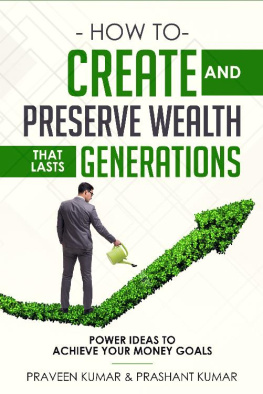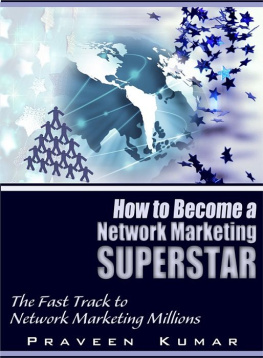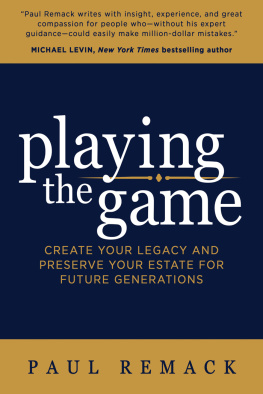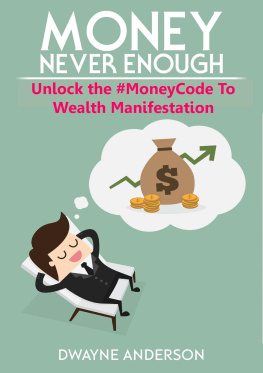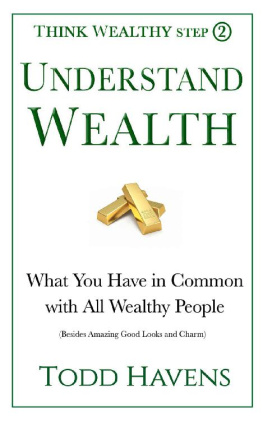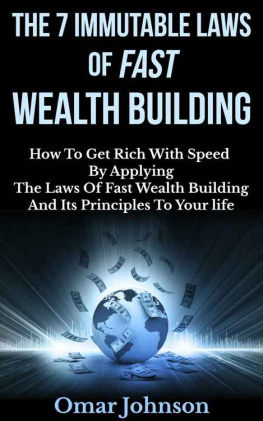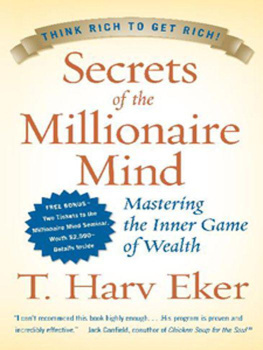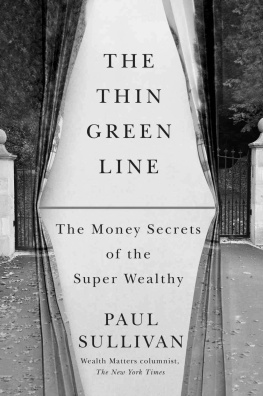How to Create and Preserve Wealth that Lasts Generations
Power Ideas to Achieve Your Money Goals
By
Praveen Kumar & Prashant Kumar
Copyright 2018 By Praveen Kumar
Terms of Use
This Electronic book is Copyright 2018 By Praveen Kumar. All rights are reserved. No part of this book may be reproduced, stored in a retrieval system, or transmitted by any means; electronic, mechanical, photocopying, recording, or otherwise, without written permission from the copyright holder(s).
Disclaimer
The advice contained in this material might not be suitable for everyone. The author obtained the information from sources believed to be reliable and from his own personal experience, but he neither implies nor intends any guarantee of accuracy.
The author, publisher and distributors never give legal, accounting, medical or any other type of professional advice. The reader must always seek those services from competent professionals that can review their own particular circumstances.
The author, publisher and distributors particularly disclaim any liability, loss, or risk taken by individuals who directly or indirectly act on the information contained herein. All readers must accept full responsibility for their use of this material.
All pictures used in this book are for illustrative purposes only. The people in the pictures are not connected with the book, author or publisher and no link or endorsement between any of them and the topic or content is implied, nor should any be assumed. The pictures are only licensed for use in this book and must not be used for any other purpose without prior written permission of the rights holder.
Table of Contents
Introduction
Have you tried balancing on one leg? It will be extremely hurtful and, in all probability, you will fall after some time. It is not only stressful but highly risky to stand on one leg the same holds true in your financial life. If you stand on one leg, you will definitely fall and hurt yourself, yet so many people keep standing on one leg financially all their lives.
To be financially stable you have to stand on minimum two legs:
- Employee + Investment
- Self Employed + Investment
- Business + Investment
Investing is the key to your financial stability whether you are an employee, self-employed or in business. There is a view that only people in jobs who do not invest are financially vulnerable. You will be surprised to learn that even very smart businessmen do not invest and their financial empire collapses because of this reason. Nothing can be further from truth. There are smart guys who build a great business and sell it for a profit of millions of dollars. They then want to repeat the process and start a new venture only to lose their entire capital.
Businesses, as they grow, demand more and more capital. In some cases, businessmen continue pouring money in expansion of their business rather than investing a part of their profits outside their business to gain financial stability.
Even a most profitable business standing on one financial leg is unstable. Smart businessmen, however, choose to do otherwise: Bill Gates sells his shares of Microsoft every year and invests in other areas to continue growing rich. His current holding in Microsoft is only 4%. Yet he continues to one of the richest men on earth.
The strongest financial legs are: business + investor, because you generate excessive cash flow from a well-run business to invest in passive income investments. Employees and self-employed people are limited in their capacity to create huge cash flow because they do not have tax advantage, leveraging power or time freedom for wealth creation. They can become wealthy if they invest intelligently but will find it extremely difficult to create accelerated wealth.
Let us examine in detail on how you can systematically graduate from your current situation to create not only financial stability but sustainable wealth that can last for generations.
In this book, we will focus on how you can create sustainable wealth by standing on two or more financial legs and more importantly preserve it so that you and your loved ones enjoy the fruits of your labor.
How to Create Sustainable Wealth?
What is sustainable wealth? The answer to this question is in this statement by Robert Kiyosaki: The rich have lots of money but the wealthy dont worry about money.
It is important to understand the difference between being rich and wealthy. A rich person can have a lot of money and possessions but a wealthy person has adequate passive cash flow to fund his or her lifestyle whether they work or not. You will be surprised to know that there are very rich people in high paying jobs who will not be able to sustain even a very basic lifestyle if they were to lose their job for some reason.
You will also be surprised to learn that a very large percentage of high income earners such as sportspersons, movie stars, doctors, engineers etc. who buy expensive cars, boats, houses, clothes, jewelry and even fancy planes to impress people; do not believe in investing and lead financially unsustainable lifestyle. They often appear to be rich but are going nowhere they spend their money recklessly, their expenses keep them worried at night.
Have you heard about Mel B of the Spice Girls fame? She earned over $50 million and blew it all up on fancy cars, private jet holidays, clothes and shoes. It is claimed that she never wore a dress twice. Her financial miss-management highlight was a gift of an island to her beloved husband who later divorced her and sued her for even more money Mel is the perfect example of being rich and not wealthy.
Wealth means number of days/ months/ years you and your family can survive without physically working and still maintain a standard of living you are used to. If you can survive only for a few days or months, then you are not doing well. If you can sustain your lifestyle indefinitely without working, you are wealthy. You are super wealthy if you not only sustain but constantly keep increasing your wealth each year without working.
Your aim should be to create sustainable wealth. This is only possible by standing on two strong financial legsone of which is investing. If you wish to be wealthy, you have to continually buy assets that give you passive cash flow. As you buy more and more assets, your cash flow will grow and make you wealthy. As a matter of principle, you have to keep your expenses less than the cash flow your assets are generating and with the surplus cash, you need to continuously buy income producing assets this will not only keep you ahead of inflation but also compound your wealth.
Your first step to financial freedom should be to become wealthy. Your next step should be to become rich and wealthy. We will examine this in some depth and how it can be achieved.
Active and Passive Cash flow
The most important word in the world of money is cash flow
Robert Kiyosaki
Cash flow is not only important for buying assets that create passive income but also to pay your bills and fund your lifestyle. If you dispassionately look at the most stressed period in your life, more often than not, it will be a time when you did not have enough money to meet your financial commitments.
Managing cash flow is important to the happiness of your family and loved ones; most individual and business bankruptcies occur when people lose sight of cash flow. Perhaps, the three most dreaded words in English language are negative cash flow.
Active cash flow is from sources where you have to physically be present and work for money. Passive cash flow is when funds flow into your pocket without any physical effort on your part. Passive cash flow is far superior to active cash flow. When money works for you day and night without you having to lift a finger that is a state you should aspire to be in. I am not saying that you should stop working or being creativeit is important to lead a productive and fulfilling life. Passive cash flow from diverse sources will give you financial stability that you and your loved ones so richly deserve. It will put an end to your financial worries so that you can lead life of your dreams.
Next page
